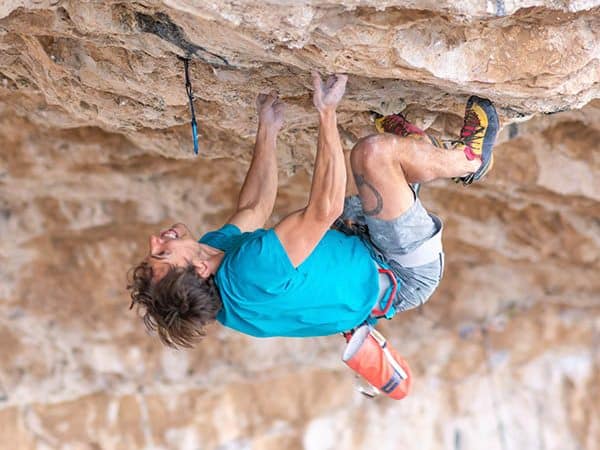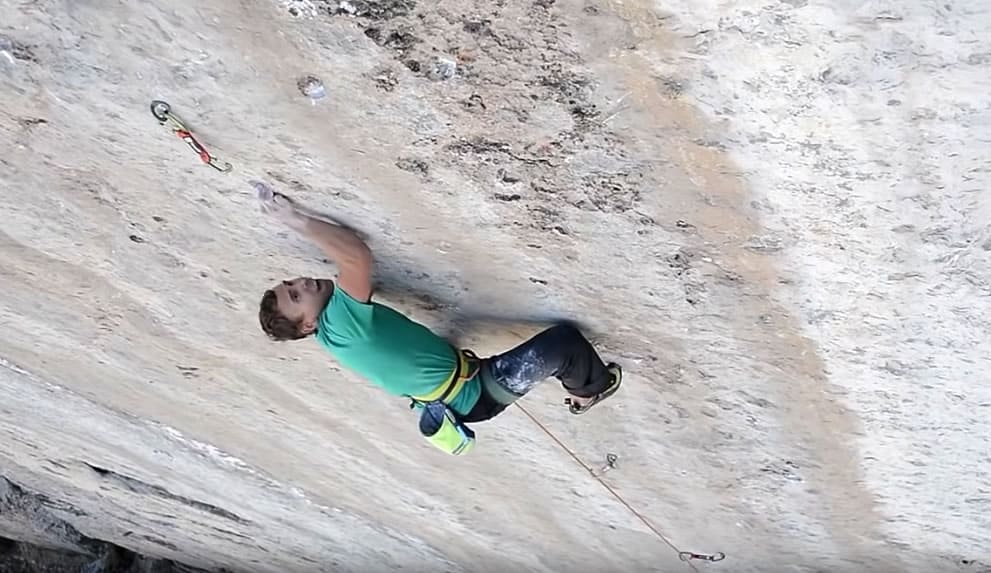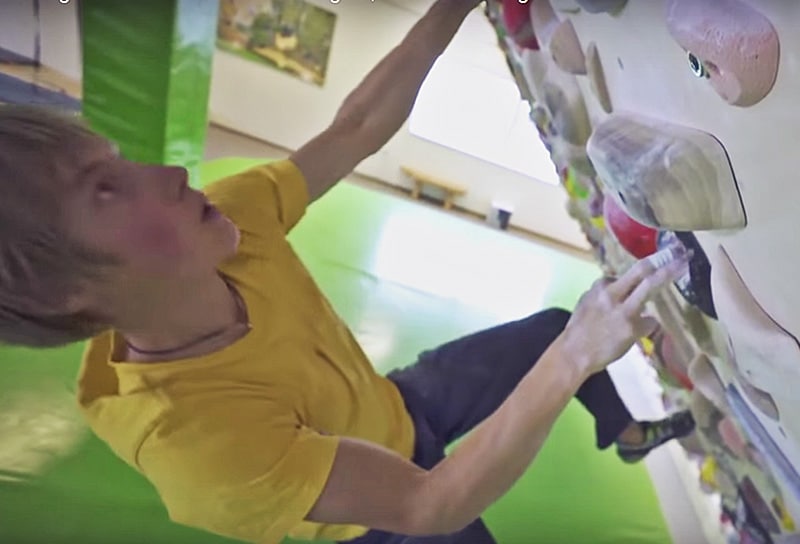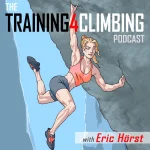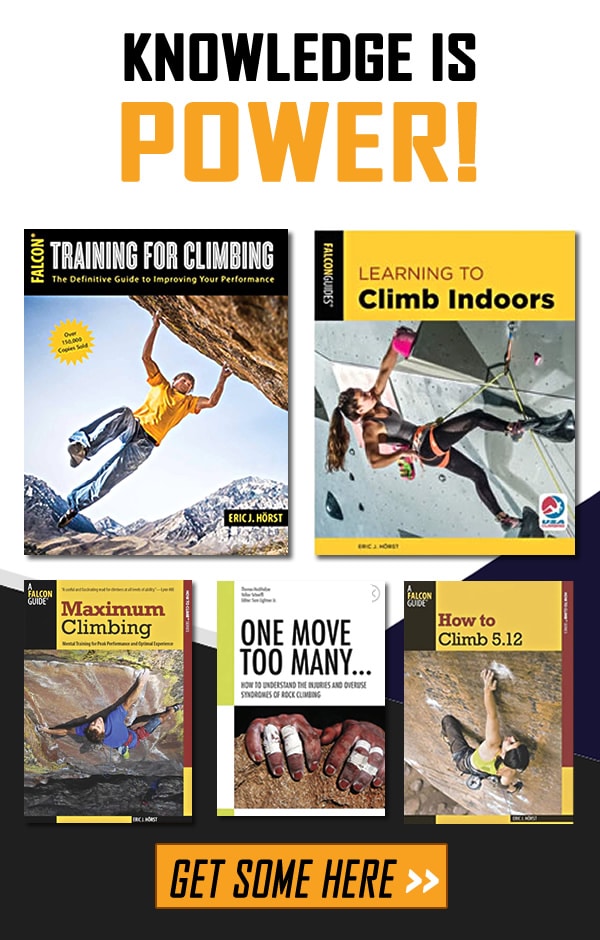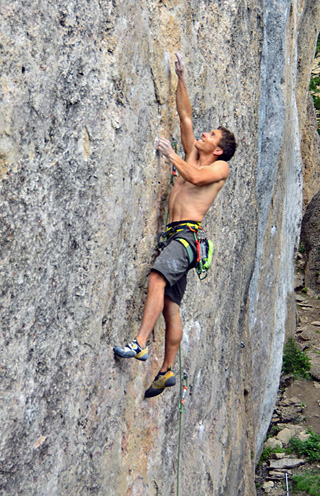
Climbers who consistently push their limits, like Jonathan Siegrist, make the most of their abilities with mental mastery. Here J-Star does the FA of Buck & Spin at Ten Sleep, WY. (Hörst photo).
Physical ability isn’t the only limiting factor when it comes to climbing your best. Improve your efficiency and effectiveness on rock with these mental mastery skills.
(This article was originally published in February 2015.)
Hanging on the rope with pumped forearms may be an all-too-familiar situation, especially if you’re passionate about pushing your limits on the rock. And, given that failure on the rock always seems to involve a lack of physical strength, it’s easy to become obsessive about strength training. In the long-run, however, you will only be able to realize your true potential when you come to understand the less obvious factors that contribute to muscular fatigue and lackluster performance.
These vital performance-limiting factors include: poor economy of movement (due to bad technique and control), overgripping (due to emotional anxiety), missed holds and rests (due to inflexible thinking), and shaken confidence (due to “fearful thinking”). All these mental issues produce premature fatigue, and likely drain your energy reserves by 50 percent or more. Learning to think and act more effectively could very well double—or triple!—your apparent strength on the rock.
Let’s examine four areas where mental mastery could help you unlock a higher level of performance.
1. Strive for Flexibility of Perspective
To break through a sticking point on a climb, you must get outside your current mindset. Detach yourself from the situation and visualize it from a perspective beyond yourself. View yourself attempting the climb from a dissociated angle, as if on TV. It’s also a good idea to visualize how some great climber you know would attack the route—what tricks and tactics would they employ to send the route that you might not have thought of? Maybe dynoing past a long reach, discovering a hidden hold, or inventing a clever rest position. Make a game out of trying to transcend the block. Be creative and have fun, and all of a sudden, the moves will begin to reveal themselves to you. You might not send the route that day, but you’ll be making progress towards your goal.
2. Become a “Reverse Paranoid”
No matter what problems you encounter, believe that the route wants you to succeed (even if you are currently flailing miserably). In this way, view each failed attempt as a signpost directing you toward a better course of action instead of becoming obsessed with a single way the route must be done. Many climbers fail on routes they are physically capable of doing because they ignore the feedback the route is giving them. Don’t fall into this trap; embrace the feedback of your setbacks as clues toward your inevitable success.
3. Leverage a “Mental Scrapbook” of Past Successes
This third strategy for mental mastery is extremely powerful, and fundamental to success in any field. Create a mental scrapbook of past successes that you can review on demand to fortify your confidence and persevere in the face of apparent failure. Relive in your mind’s eye the process of some of your greatest accomplishments, both climbing and non-climbing. Make these mental movies vivid and get inside them as if they were happening again at the present moment. Feel the exhilaration and joy of the accomplishment, then take that emotion and apply it to the difficult situation with which you presently faced. Forge ahead wearing the armor of your past successes to reach a whole new level of performance.
4. Strive to Develop “Hanging-On Power”
Hanging-on power is an attribute that all great climbers and high achievers in any field possess, which enables them to persist beyond ordinary limits. Sometimes winning or succeeding isn’t a matter of having more absolute strength or skill than others possess, it might just come down to being able to hang on and persevere longer.
This is an ability you develop from progressively subjecting yourself to greater and greater challenges that require higher levels of stick-to-itiveness. Just as in strengthening the muscles of your body, you strengthen mental muscle by challenging it in an incremental, progressive way.
The bottom line: While some climbers give up at the first sign of adversity on a route, the best climbers keep coming back and hanging on—mentally and physically—until they succeed. Foster this skill for mental mastery and you’ll outperform the masses in anything you do!
Related:
- 10 Mental Strategies to Improve Performance…In Climbing and Beyond!
- Climb Better by Optimizing Your Arousal and Energy Levels
- Relaxation Strategies for Calm and Collected Climbing
- Excitation Strategies for Amped and Energized Climbing
- 4 Tips for Becoming a Head Strong Climber
Copyright © 2000–2022 Eric J. Hörst | All Rights Reserved.

